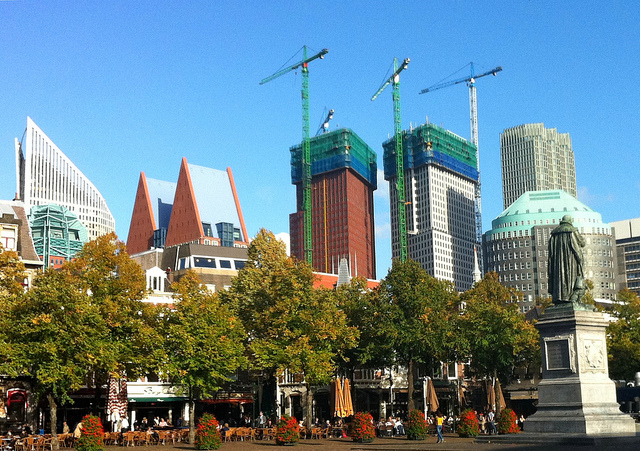
Cities have to be more and more creative when it comes to financing their projects and programmes. With budget cuts on the rise and traditional subsidy schemes disappearing, they have to increasingly look for alternatives. URBACT Project CSI Europe investigates the potential role and added value of financial instruments such as urban investment funds.
Ton Overmeire is programme manager ‘European Funds’ at the Municipality of The Hague. He has been dealing with the issue of funding urban development for years. At the moment, he is also actively involved in the URBACT Project CSI Europe. “With this project we aim to look for new financial instruments for cities. We believe subsidies are not the only available option. Revolving funds also form an important opportunity for cities. That is why The Hague has now established two so-called Urban Development Funds.”
In such an Urban Development Fund, municipal funds are managed and invested by a fund manager working for a private bank, on the basis of a strategy determined by the city council. The idea is that investments pay back, and that the money ‘earned’ is re-invested in other urban projects. In other words, public funds are put aside, without the municipality being able to decide on how these funds are going to be spent exactly. The fund manager takes these kinds of decisions. Such a scheme is quite revolutionary. However, Ton Overmeire is convinced of this working method. “Civil servants are very well able to allocate subsidies, and they should definitely continue to do so. Making investments requires rather different skills though. One has to be able to weigh the social and financial effects of certain investments. Civil servants do not have the right knowledge and experience to do so.”
Pilot funds in The Hague
In The Hague, there was a great need for financial means for projects in the field of energy and spatial development. That is why two pilot funds were set up: a fund for energy efficiency (ED), and a fund for urban space & economy (FRED). These funds include European, national as well as local money. “The fund has been officially launched very recently. We expect to be able to present the first results mid-2014. There are already several projects that will be financed by FRED and ED”, Ton Overmeire enthusiastically explains.
What type of projects will be invested in? “One could for example think of investments in the geothermal plant in The Hague South West, a service with great potential, which might disappear because of delays in the construction of housing. Basically all necessary investments in the plant have been made. We only need some money to enable several final investments. The parties involved say they do not have the financials means to cover these investments at the moment, due to the economic crisis. However, the business case is very good, and it would be a great loss for The Hague if the geothermal plant were closed. In this case, a fund like ED may form a solution. When it comes to FRED, we particularly think of investments in small-scale offices and working spaces for local entrepreneurs. There is a great need for such spaces in The Hague, but usually regular banks are not very eager to invest in them, and it is difficult for entrepreneurs to get a mortgage. In the case of such market failure, FRED might be able to turn things around.”
Learning from European cities
It all sounds rather direct and simple, but setting up an urban investment funds if not easy. Cities need to deal with a wide range of European and national rules, including for example regulations on state aid and public procurement. That is why The Hague is very happy to be able to exchange ideas with the partners of CSI Europe. “So far, we have especially learned a lot from Manchester. They already had a lot of experience in this field, especially when it comes to state aid. Actually, we have largely copied their model for the investment fund. In the future, we also still hope to learn from the Portuguese city of Porto. They have been very successful at bringing in national grants. In addition, it is also very interesting to be in touch with a city like Malmö, because in Sweden, it is currently still illegal to set up the kinds of financial structures we have recently erected in The Hague.”
Europe is keen on the idea of urban investment funds, and also European cities are become more and more interested in such financial instruments. In 2015, when CSI Europe will come to an end, the cities involved hope to have contributed to the development of investment funds and related instruments. The project should form a source of inspiration to all European cities, so that urban development will not solely depend on government funds and subsidies in the future…
More informations on the CSI Europe Project Minisite!
By the URBACT Contact Point in The Netherlands




A great example of a City developing sustainable investment funds and sharing it’s learning with others across Europe.
This is a good example for Integrated city Sustainable developments Globally. Thank you. John Gakunga
[…] održivog urbanog razvoja Europske komisije u okviru inicijative Jessica Den Haag je osnovao dva fonda: fond za energetsku učinkovitost (ED) te fond za urbani prostor i ekonomiju (FRED). U tim […]